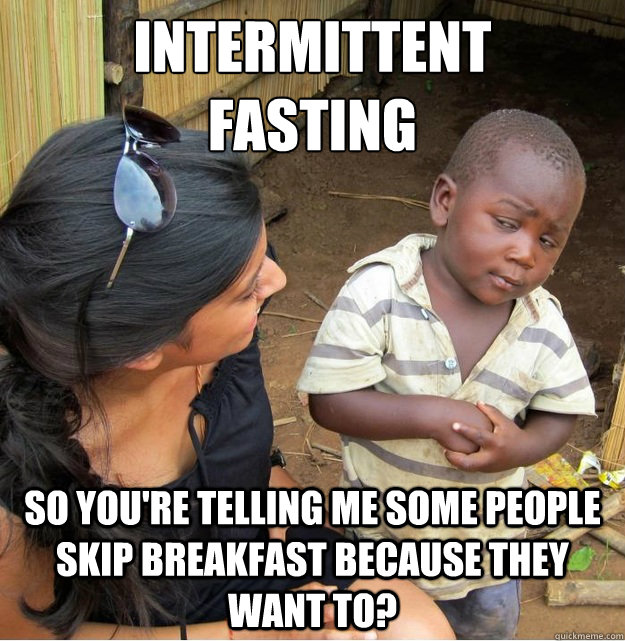
Intermittent Fasting
First there was the "Eat 3 square meals a day," followed by "6 small meals throughout the day is best," and now there is "Intermittent Fasting." It's difficult to keep up with the ever-changing theories of dietary strategies and weight-loss as there always seems to be something new hitting the market. Intermittent Fasting (IF) is a new diet strategy intended to enhance fat loss and improve body composition. It consists of alternating periods of fasting (only water and/or calorie-free liquids) and eating. So what's the difference between that and regular eating patterns? Intermittent Fasting designates certain extended periods of time as "Fasting" followed by a relatively short, or none at all, window of time when food can be consumed. The rationale behind this strategy is that the periods of fasting will maximize fat burning while still maintaining lean muscle mass which is why it is often used to improve body composition. There are a few different methods of intermittent fasting which are described below.

The Periodic Fast
This method consists of a 24 hr fasting period which is to be used ~1 day per week. The creators of the IF diet don't recommend starting off with this method as it can be difficult for your body to adjust to the sudden lack of food. The only thing that is allowed during this fast period is water, low calorie beverages (i.e. diet green tea, coffee etc.) and BCAA's (in pill form). The green tea and caffeine are substances that promote fat-burning and are thus included during the fasting period. The BCAA"s are intended to maintain muscle mass and help stimulate the building of new muscle tissue.
Below is an excerpt from the Book: "Precision Nutrition" by Dr. John Berardi which describes a sample day utilizing the Periodic Fast:
Below is an excerpt from the Book: "Precision Nutrition" by Dr. John Berardi which describes a sample day utilizing the Periodic Fast:
".....HOW TO DO IT
Essentially, you pick any 24-hour period, and don’t eat during it. But we like to add a few things to make it easier. Here, we’ll assume a Sunday fast:
10 PM Saturday:
- Eat your last meal of the day
- Drink 500 mL (2 cups) of water
10 AM Sunday:
- Drink 1 L (4 cups) of water + 1 serving greens powder
- Drink 250 mL (1 cup) of green tea
- Take 5 grams BCAA (branched chain amino acids) powder (or take 5 capsules)
3 PM Sunday:
- Drink 1 L (4 cups) of water + 1 serving greens powder
- Drink 250 mL (1 cup) green tea
- Take 5 grams BCAA (branched chain amino acids) powder (or take 5 capsules)
10 PM Sunday:
- Eat a small snack before bed
- Drink 500 mL (2 cups) of water
Monday:
- Eat normally....."

The Daily Fast
This strategy breaks up a 24 hr period into 2 windows: 1) A fasting window and 2) An eating window. The authors recommend a 16 hr fast and 8 hr feeding window. Now, this doesn't mean that you are eating constantly throughout the 8 hr eating window. The authors of Precision Nutrition recommend 3-4 meals during the 8 hr feeding window instead of 1 large meal or 8 hrs of grazing. Now, if you are an individual who trains or exercises during the week (and if you read this blog I hope that you do!) it's recommended that you get your workout in at the end of the 16 hr fast and then consume your first meal immediately after your workout. This may be challenging for some people as working out on an empty stomach may not be well-tolerated (I just about pass out every time).
 And Then Eat....
And Then Eat.... 
Monday
8:30 PM - Eat small snack (last meal before 16 hr fast)
Tuesday
8:00 AM: Wake up, Drink 500 ml of water
9:00 AM: Drink 1 L of water + 250 ml of green tea
11:00 AM: 250 ml of green tea
12:00 AM: Workout session with 10g of BCAA before/during
1:30 PM: Eat first meal (largest of the day)
4:30 PM: Eat second meal (moderate size)
8:30 PM: Eat third meal (moderate to small size)
Tips:
Just because you are strategically eating (or not eating) at certain times throughout the day, doesn't mean that when you do eat that you splurge and park yourself at an All You Can Eat Buffet all day. It is still just as important to eat not only the proper amount of calories but also the proper ratio of macro-nutrients, focusing on lean meats and fruits & veggies.
Does It Work?
And now, the important question: Does it work? Granted there isn't really any clinical research that has been done on this program, I believe it's safe to say that yes, this program is an effective strategy for losing body fat and improving body composition. The majority of anecdotal evidence I've heard on IF has been in support of it and said it was successful at improving body composition. Personally, I'm someone who loves food and gets cranky when I go extended periods without it so this diet plan isn't really for me but don't let that deter you from trying it! Also, I DO NOT recommend this program for athletes or those engaged in heavy training as it may be difficult to A) Train on an empty stomach and B) Consume enough calories to support high energy expenditures. If you are interested in trying this new diet, I suggest starting slowly and easing yourself into fasting periods to prevent hunger pangs, mood disturbances and dizziness. And please, if you do try this diet let me know what you think of it because I'd love to hear if it worked or not!
http://www.precisionnutrition.com/intermittent-fasting/appendix-a

http://www.ncbi.nlm.nih.gov/pubmed/23171320
ReplyDeleteA little research to back up IF